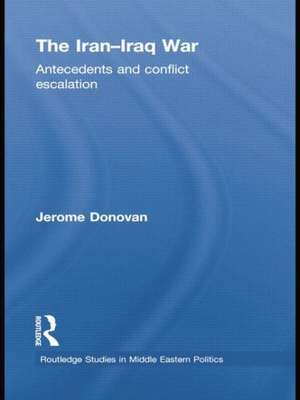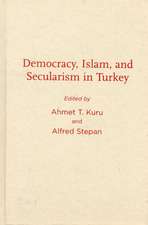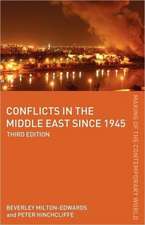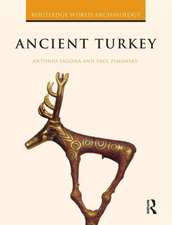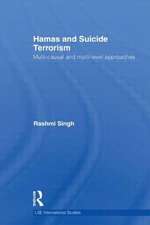The Iran-Iraq War: Antecedents and Conflict Escalation: Routledge Studies in Middle Eastern Politics
Autor Jerome Donovanen Limba Engleză Paperback – 27 feb 2014
Explaining the systemic nature of conflict within the Middle East, and specifically between Iran and Iraq, the book illustrates how IR theory can be utilised in explaining conflict dynamics in the Middle East. The author’s integrated approach to understanding interstate conflict escalation demonstrates that when taken together issues, interaction and power capabilities lend themselves to a much richer account of the dyadic relationship between Iran and Iraq in the lead up to war in 1980.
Addressing a disparity between international relations and Middle Eastern area studies, this book fills an important gap in the existing scholarly literature on the causes of war. As such, it will be of great interest to scholars of peace and conflict studies, Middle Eastern studies and International Relations.
| Toate formatele și edițiile | Preț | Express |
|---|---|---|
| Paperback (1) | 438.86 lei 6-8 săpt. | |
| Taylor & Francis – 27 feb 2014 | 438.86 lei 6-8 săpt. | |
| Hardback (1) | 1056.00 lei 6-8 săpt. | |
| Taylor & Francis – 9 dec 2010 | 1056.00 lei 6-8 săpt. |
Din seria Routledge Studies in Middle Eastern Politics
-
 Preț: 311.41 lei
Preț: 311.41 lei -
 Preț: 280.08 lei
Preț: 280.08 lei -
 Preț: 309.89 lei
Preț: 309.89 lei -
 Preț: 302.13 lei
Preț: 302.13 lei - 9%
 Preț: 1004.93 lei
Preț: 1004.93 lei - 18%
 Preț: 1065.06 lei
Preț: 1065.06 lei - 18%
 Preț: 1170.14 lei
Preț: 1170.14 lei - 12%
 Preț: 300.49 lei
Preț: 300.49 lei - 18%
 Preț: 1057.57 lei
Preț: 1057.57 lei - 14%
 Preț: 299.06 lei
Preț: 299.06 lei - 18%
 Preț: 1162.08 lei
Preț: 1162.08 lei - 28%
 Preț: 850.37 lei
Preț: 850.37 lei - 18%
 Preț: 1066.09 lei
Preț: 1066.09 lei - 18%
 Preț: 1057.05 lei
Preț: 1057.05 lei - 18%
 Preț: 1059.48 lei
Preț: 1059.48 lei - 18%
 Preț: 1166.49 lei
Preț: 1166.49 lei - 18%
 Preț: 1062.31 lei
Preț: 1062.31 lei - 25%
 Preț: 854.33 lei
Preț: 854.33 lei -
 Preț: 418.22 lei
Preț: 418.22 lei -
 Preț: 341.20 lei
Preț: 341.20 lei -
 Preț: 409.69 lei
Preț: 409.69 lei - 18%
 Preț: 1061.06 lei
Preț: 1061.06 lei - 18%
 Preț: 1056.00 lei
Preț: 1056.00 lei -
 Preț: 287.99 lei
Preț: 287.99 lei - 18%
 Preț: 1057.57 lei
Preț: 1057.57 lei - 18%
 Preț: 1001.87 lei
Preț: 1001.87 lei - 18%
 Preț: 1055.84 lei
Preț: 1055.84 lei - 18%
 Preț: 1052.38 lei
Preț: 1052.38 lei - 18%
 Preț: 1057.89 lei
Preț: 1057.89 lei - 26%
 Preț: 822.36 lei
Preț: 822.36 lei - 18%
 Preț: 1057.26 lei
Preț: 1057.26 lei - 18%
 Preț: 1439.85 lei
Preț: 1439.85 lei - 18%
 Preț: 1164.92 lei
Preț: 1164.92 lei - 18%
 Preț: 1057.75 lei
Preț: 1057.75 lei - 26%
 Preț: 821.29 lei
Preț: 821.29 lei - 18%
 Preț: 1058.79 lei
Preț: 1058.79 lei - 18%
 Preț: 1057.75 lei
Preț: 1057.75 lei - 18%
 Preț: 1056.32 lei
Preț: 1056.32 lei - 18%
 Preț: 1055.69 lei
Preț: 1055.69 lei - 25%
 Preț: 824.70 lei
Preț: 824.70 lei - 18%
 Preț: 1060.25 lei
Preț: 1060.25 lei - 18%
 Preț: 1060.87 lei
Preț: 1060.87 lei - 18%
 Preț: 1071.30 lei
Preț: 1071.30 lei - 26%
 Preț: 820.03 lei
Preț: 820.03 lei - 18%
 Preț: 1056.35 lei
Preț: 1056.35 lei - 18%
 Preț: 1061.22 lei
Preț: 1061.22 lei
Preț: 438.86 lei
Nou
Puncte Express: 658
Preț estimativ în valută:
83.97€ • 87.91$ • 69.48£
83.97€ • 87.91$ • 69.48£
Carte tipărită la comandă
Livrare economică 05-19 aprilie
Preluare comenzi: 021 569.72.76
Specificații
ISBN-13: 9781138788930
ISBN-10: 1138788937
Pagini: 176
Ilustrații: black & white tables, figures
Dimensiuni: 138 x 216 x 13 mm
Greutate: 0.2 kg
Ediția:1
Editura: Taylor & Francis
Colecția Routledge
Seria Routledge Studies in Middle Eastern Politics
Locul publicării:Oxford, United Kingdom
ISBN-10: 1138788937
Pagini: 176
Ilustrații: black & white tables, figures
Dimensiuni: 138 x 216 x 13 mm
Greutate: 0.2 kg
Ediția:1
Editura: Taylor & Francis
Colecția Routledge
Seria Routledge Studies in Middle Eastern Politics
Locul publicării:Oxford, United Kingdom
Public țintă
Postgraduate and UndergraduateCuprins
1. An Integrated Approach to Understanding Interstate Conflict Escalation: Introduction 2. An Integrated Approach to Understanding Interstate Conflict Escalation: Theoretical Foundations 3. The Pre-Algiers Period: Phase 1 of Iran-Iraq Relations 4. The Detente Period: Phase 2 of Iran-Iraq Relations 5. The Post-Revolution Period: Phase 3 of Iran-Iraq Relations 6. Conclusions: Explaining The Iran-Iraq War
Recenzii
"Jerome Donovan covers an important topic which has so far received little attention in the scholarly literature on the causes of war, namely the dynamics which led to the escalation of a regional conflict between Iran and Iraq to a full scale war in the 1980s. He provides an integrated approach to the conflict and explains it in terms of the issues under contention, foreign policy reciprocity and power capabilities. Donovan points research toward the broader concerns of war causation as related to the issues that initially generate conflict between two states, the contextual features of the dyadic relationship which lead a conflict to evolve into a war, and the permissive and constraining features which allow for such an evolution. This book is a timely reminder of a war that continues to shape the politics of the region, as well as a significant contribution to international relations and conflict studies literature."
Amr G. E. Sabet, Helsinki University
"The preoccupation with the more recent Iraq war has led to diminished attention to the Iran / Iraq conflict that dominated the Gulf from September 1980 and the subsequent 8 years. Jerome Donovan’s detailed work on the determinants of the conflict puts in context the background against which world leaders struggled to get to grips with the intentions of Saddam Hussein over the succeeding decade and a half. Donovan’s work on status, prestige and influence, raises significant issues about what might have motivated Saddam as he dealt with the concerns of the UN about what preparations he might be making for future conflict, and also gives a pointer as to why he was not more cooperative.
Policy makers and academics will also find Donovan’s work revealing about the present sectarian tensions that affect Iraq, and beyond that, the psychological and historic imperatives driving President Ahmadinejad in Iran.
Donovan has produced a study that adds to the body of academic analysis of the causes of interstate war, and he has also produced a useful resume of the regional tensions that have impacted on both Iran and Iraq and have real resonance today."
Helen Liddell, British High Commissioner to Australia 2005-2009, Member of the British Cabinet 2001-2003
Amr G. E. Sabet, Helsinki University
"The preoccupation with the more recent Iraq war has led to diminished attention to the Iran / Iraq conflict that dominated the Gulf from September 1980 and the subsequent 8 years. Jerome Donovan’s detailed work on the determinants of the conflict puts in context the background against which world leaders struggled to get to grips with the intentions of Saddam Hussein over the succeeding decade and a half. Donovan’s work on status, prestige and influence, raises significant issues about what might have motivated Saddam as he dealt with the concerns of the UN about what preparations he might be making for future conflict, and also gives a pointer as to why he was not more cooperative.
Policy makers and academics will also find Donovan’s work revealing about the present sectarian tensions that affect Iraq, and beyond that, the psychological and historic imperatives driving President Ahmadinejad in Iran.
Donovan has produced a study that adds to the body of academic analysis of the causes of interstate war, and he has also produced a useful resume of the regional tensions that have impacted on both Iran and Iraq and have real resonance today."
Helen Liddell, British High Commissioner to Australia 2005-2009, Member of the British Cabinet 2001-2003
Descriere
This book employs international relations theory to help explain one of the Middle East’s bloodiest conflicts. Using power transition and foreign policy reciprocity theory, the author develops new insights into the Iran-Iraq war.
